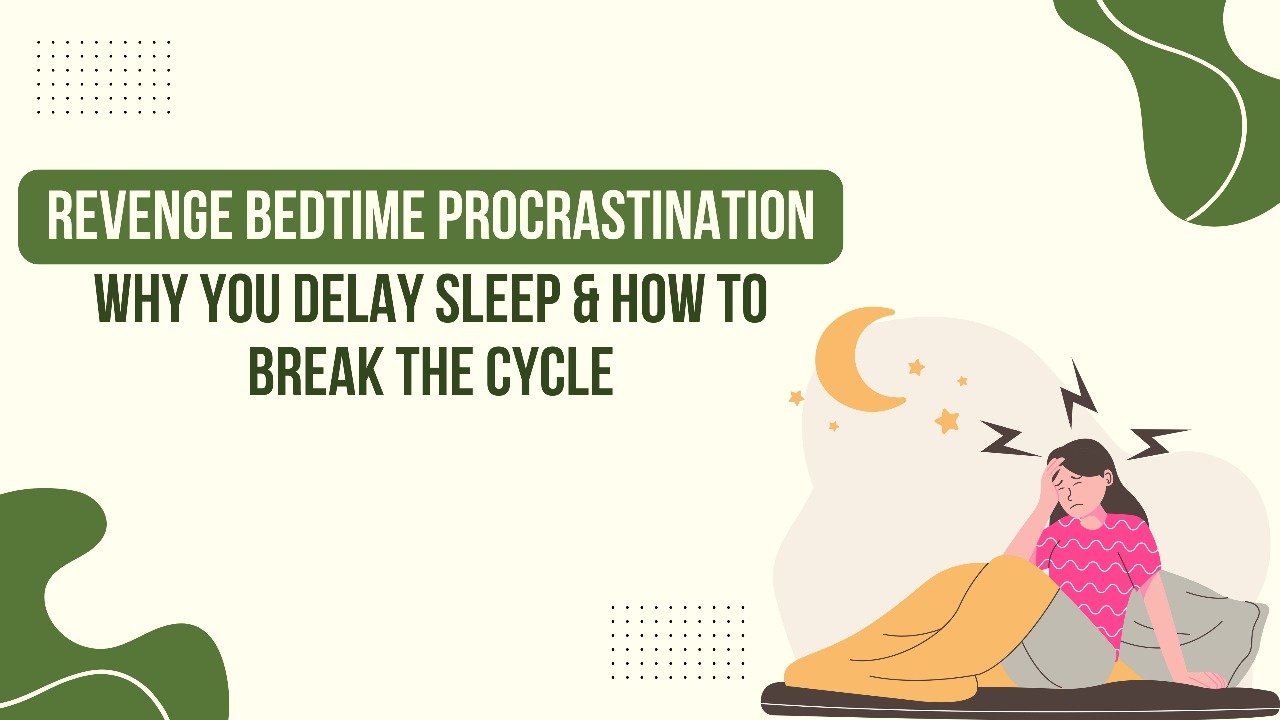Ever found yourself doom-scrolling at midnight, fully aware you need to wake up early, but still unable to put your phone down? You’re not alone.
Welcome to the era of Revenge Bedtime Procrastination, a quiet rebellion against the packed calendars, back-to-back responsibilities, and the constant go-go-go of our waking hours.
Let’s unpack the science behind why we sabotage our sleep and how to take back control without feeling deprived.
What Is Revenge Bedtime Procrastination?
The term originated in China as “bàofùxìng áoyè”, meaning “revenge night owlism.” It’s when people delay sleep to reclaim personal time after a packed day.
It’s your brain’s way of saying:
“If I couldn’t choose how I spent my day, I’ll steal back the night.”
But while the late-night scrolling, binging, or mindless YouTube spirals feel like freedom in the moment, they’re robbing you of real restoration.
The Biology Behind the Bad Habit
When you push back bedtime, you’re not just shortening sleep, you’re disrupting your circadian rhythm (your internal clock). This has a ripple effect on:
- Hormones (especially cortisol and melatonin)
- Heart health (linked to increased BP and HR)
- Cognitive function (mood, memory, focus)
- Metabolic balance (insulin resistance and inflammation)
Studies show sleep deprivation is directly linked to:
- Higher resting heart rate
- Increased blood pressure
- Greater cardiovascular risk, even among healthy individuals
- In fact, consistently poor sleep increases the risk of heart disease by up to 48%, according to multiple cohort studies.
So Why Do We Keep Doing It?
Here’s what behavioral science tells us:
1. Low perceived control
→ If your day is full of tasks dictated by others, your brain tries to reclaim “autonomy” at night.
2. Reward-seeking behavior
→ Sleep offers no immediate dopamine; Instagram, food, or a binge-worthy show does.
→ When you stay wired all day, your brain doesn’t switch off. That “tired but wired” feeling? It’s real.
4. Poor transitions
→ Jumping from screen time to bed without a wind-down routine keeps your sympathetic nervous system (fight or flight) active.
How to Break the Cycle Without Losing Your ‘Me Time’
You don’t need a complete lifestyle overhaul, just better transitions.
1. Schedule Your “Me Time” Earlier
Block out 30 minutes right after work or dinner to read, walk, or scroll guilt-free. Your sleep doesn’t have to suffer for you to unwind.
2. Romanticize Sleep
Your bed isn’t just a place to crash, it’s a recovery chamber. Start treating sleep like skincare or spa time: dim lights, soft music, magnesium oil, and an intentional exit from your day.
3. Try Parasympathetic Practices
Simple yoga techniques like:
- Bhramari pranayama (bee breath)
- Supta Baddha Konasana (reclining butterfly pose)
- 5-7-8 breathing
These shift your body from stress mode into repair mode, shown to boost heart rate variability (HRV) and calm overactive brains.
4. Create a Gentle Digital Curfew
No hard rules. Just gradually taper off screens 30–60 minutes before bed. Start with airplane mode, blue light filters, or reading a real book.
5. Use a Brain Dump Journal
Write down everything on your mind before bed — to-do lists, thoughts, worries. It’s proven to reduce sleep latency and reduce nighttime rumination.
Mindset Shift: Sleep Is Not a Luxury
You don’t earn rest.
You need it to be your best.
And your heart? It beats better when you do.
Sleep is your built-in medicine and it’s free.
Real Talk
Revenge bedtime procrastination isn’t laziness or lack of discipline; it’s often a cry for agency in a day that didn’t offer you much.
So instead of fighting the urge, redirect it. Create rituals that feel like you, but still allow your body and brain to recover.
Because a tired heart is a vulnerable heart.
And sleep is the gift you give your future self.
Your heart called—it wants more yoga.
Tap into our Yoga & Exercise section for easy-to-follow flows, no-fluff tools, and science-backed moves made for real life and honest hearts.
📚 P.S. A little heart-to-heart is coming your way.
Dr. Indranill Basu Ray’s new book on heart health and yoga is dropping soon; packed with practical insights for everyone (not just yogis or Dr’s). Stay in the loop, your heart will thank you.
___________________________________________________________________________________


